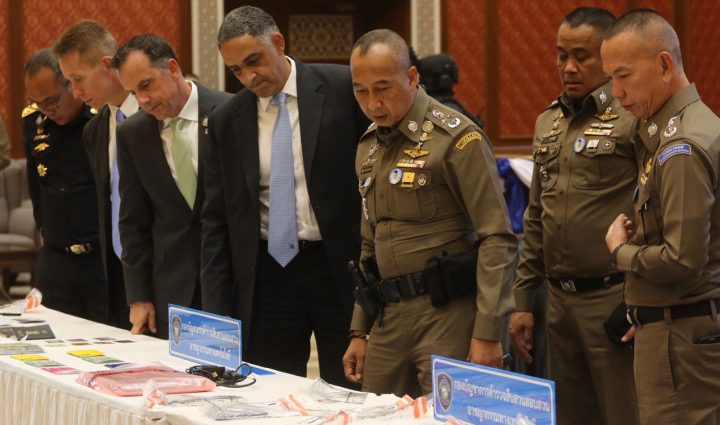15 Thais and 5 Indians now detained in connection with network that bilked people out of B3 billion

A total of 20 people — five Indian nationals and 15 Thais — have now been arrested for alleged involvement in a phone scam network preying on elderly Americans with damages exceeding 3 billion baht, police said on Wednesday.
The arrests were made during police raids in four provinces — Chon Buri, Rayong, Roi Et and Surat Thani — on Tuesday. Police said at the time that one Indian man and three Thai women had been detained in Chon Buri, and they subsequently provided details on another 16 arrests.
All five of the Indian suspects were men and 11 of the 15 Thais detained were women, Pol Gen Torsak Sukwimol, a deputy national police chief, said on Wednesday.
Seized from them were 162 bank account books, 61 mobile phones, two cars, one pistol, land title deeds and other assets, he said.
The investigation dates back to last year, when US Federal Bureau of Investigation (FBI) and Secret Service agents informed Thai police that Indian cyber criminals and Thai nationals had set up a phone scam network to trick elderly people in the United States into transferring money to them.
The fraudsters, pretending to be US law-enforcement officials, preyed on the fear of their victims by telling them that they were being investigated for alleged money laundering. The callers then demanded that they transfer money into their “mule” accounts if they wanted to have the cases settled without further litigation.
In some cases the victims were sent links containing viruses, which allowed the scammers to take control of their devices.
As many as 72,000 phone scam cases were reported between 2020 and 2021 with damages exceeding US$3 billion, said Pol Gen Torsak. The US requested help from Thailand with 365 cases.
According to the investigation, the scammers worked in a network that divided tasks among its members, and ill-gotten assets were concealed. The gang used Thailand, Cambodia, Singapore, Malaysia, Hong Kong, the United Arab Emirates, Peru and Poland as bases to receive money transfers from victims. The damage exceeded 3 billion baht, said Pol Gen Torsak.
Most of the victims were elderly people from various careers including physicians, university lecturers, dentists, military officers and business operators, he added.
The scam gang in Thailand had about one billion baht in circulation, authorities said. Bank account books seized from the suspects found links to juristic persons in the network. Some of the proceeds had been laundered through gold shops, restaurants and entertainment venues in Chon Buri, said Pol Gen Torsak.
The network had about 10 million baht a month in circulation, judging from the seized bank accounts.
Pol Lt Gen Worawat Watnakhonbancha, commissioner of the Cyber Crime Investigation Bureau (CCIB), said one of the victims of the scam was a Thai national who lost 1.8 million baht.
The Indian suspects initiated the plan by asking Thais to open bank accounts and open companies. Money was later withdrawn from those bank accounts for the Indian suspects, said Pol Gen Worawat.
The investigation was being widened to arrest more people involved, he added.
According to Pol Gen Worawat, some Americans and foreign nationals working in the US had sold information to the Indian-led gang. The ringleaders used some of the money they made to buy real estate in Thailand and sent some to their home country, he added.
The suspects have been charged with colluding in transnational crime, fraud, putting false information into a computer system, laundering money and related offences.
The five Indian suspects were identified as Nandakishore Joshi, 42; Avatar Singh, 36; Yogesh Kumar, 34; Karunal Kumar Gotchakpai Topiwala, 40; and Kitan Tribhuvandej Panchal, 53.
The 15 Thais were Darannaphat Hinchan, 33; Preedaporn Hinchan, 27; Areeyaporn Sridongklang, 41; Sakhanin Saenpradit, 38; Thatsanee Phokinnaowaphan, 50; Sukanya Phankhong, 24; Natthawut Jaithongkla 25; Yada Rotjanasalee, 19; Nanthawat Mum-apai, 23; Jit Phorchan, 61; Arthit Boonlar, 36; Khwanjira Sirithammachak, 32, Mayuree Naphaengsorn, 20; Yuan Yunui 64; and Arunrat Kerdmolee, 23.

